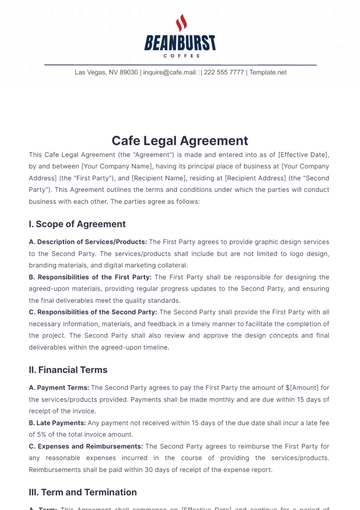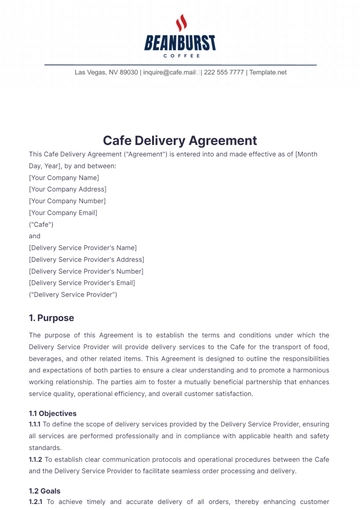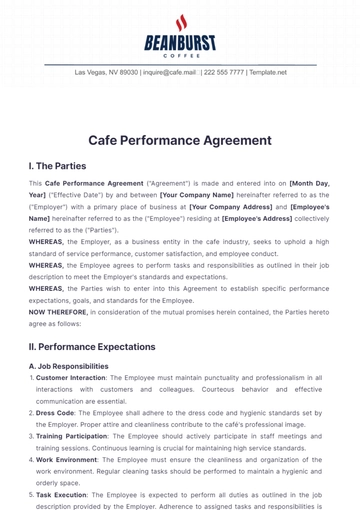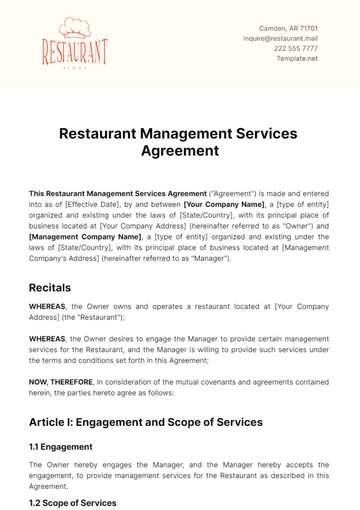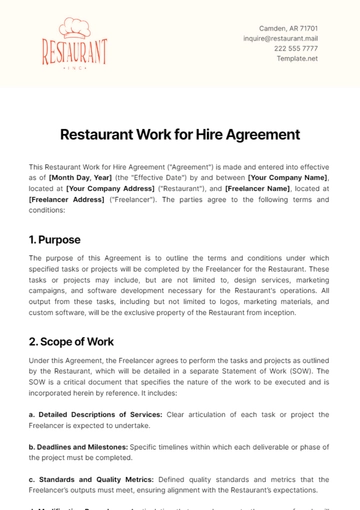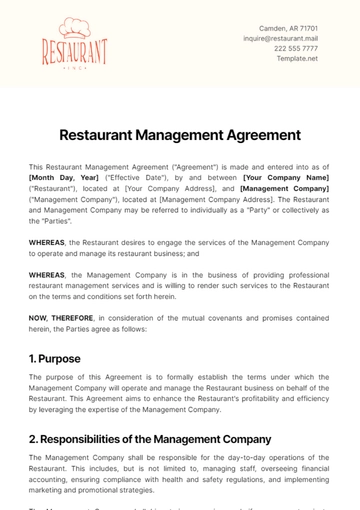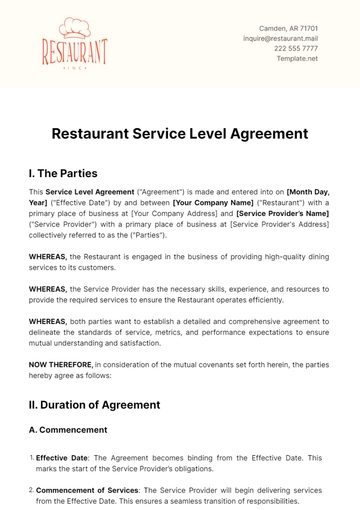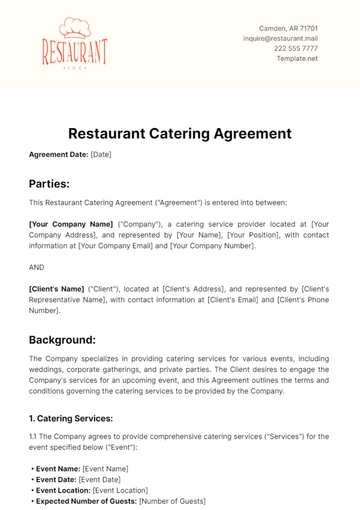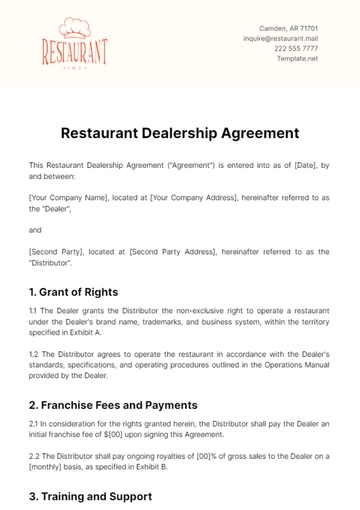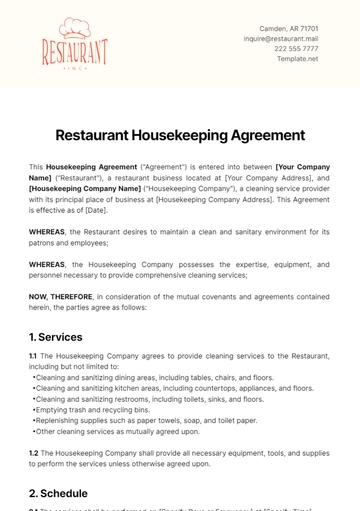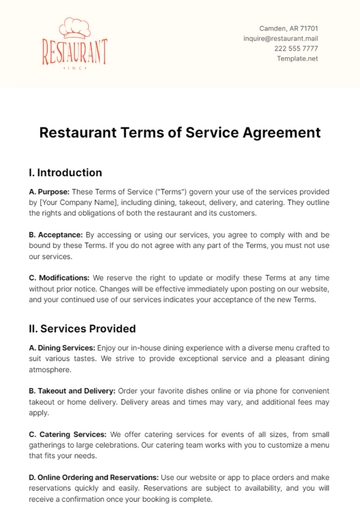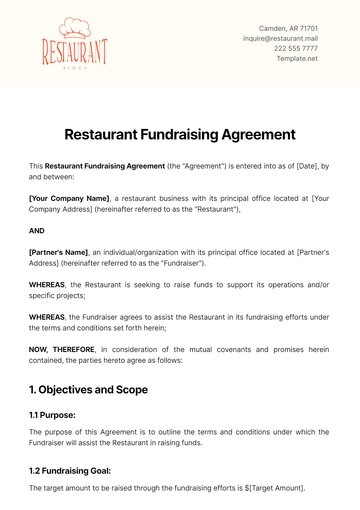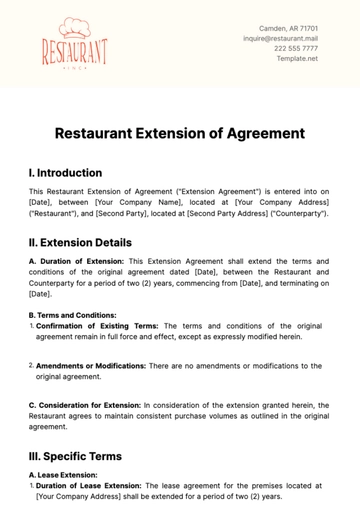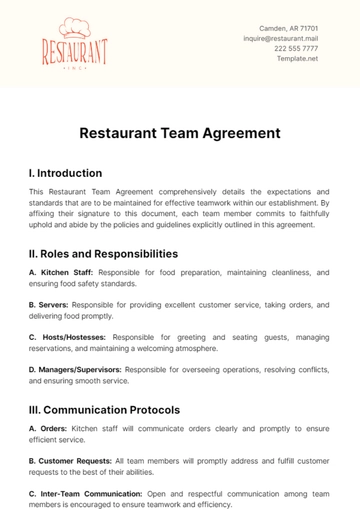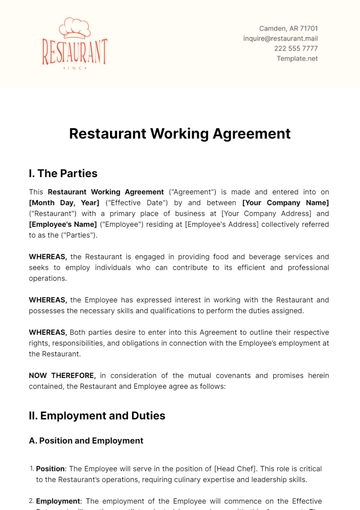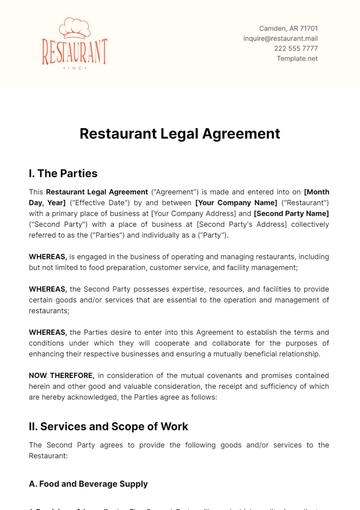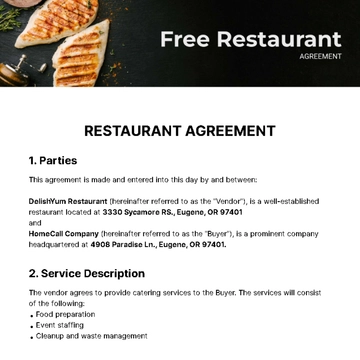Free Restaurant Working Agreement
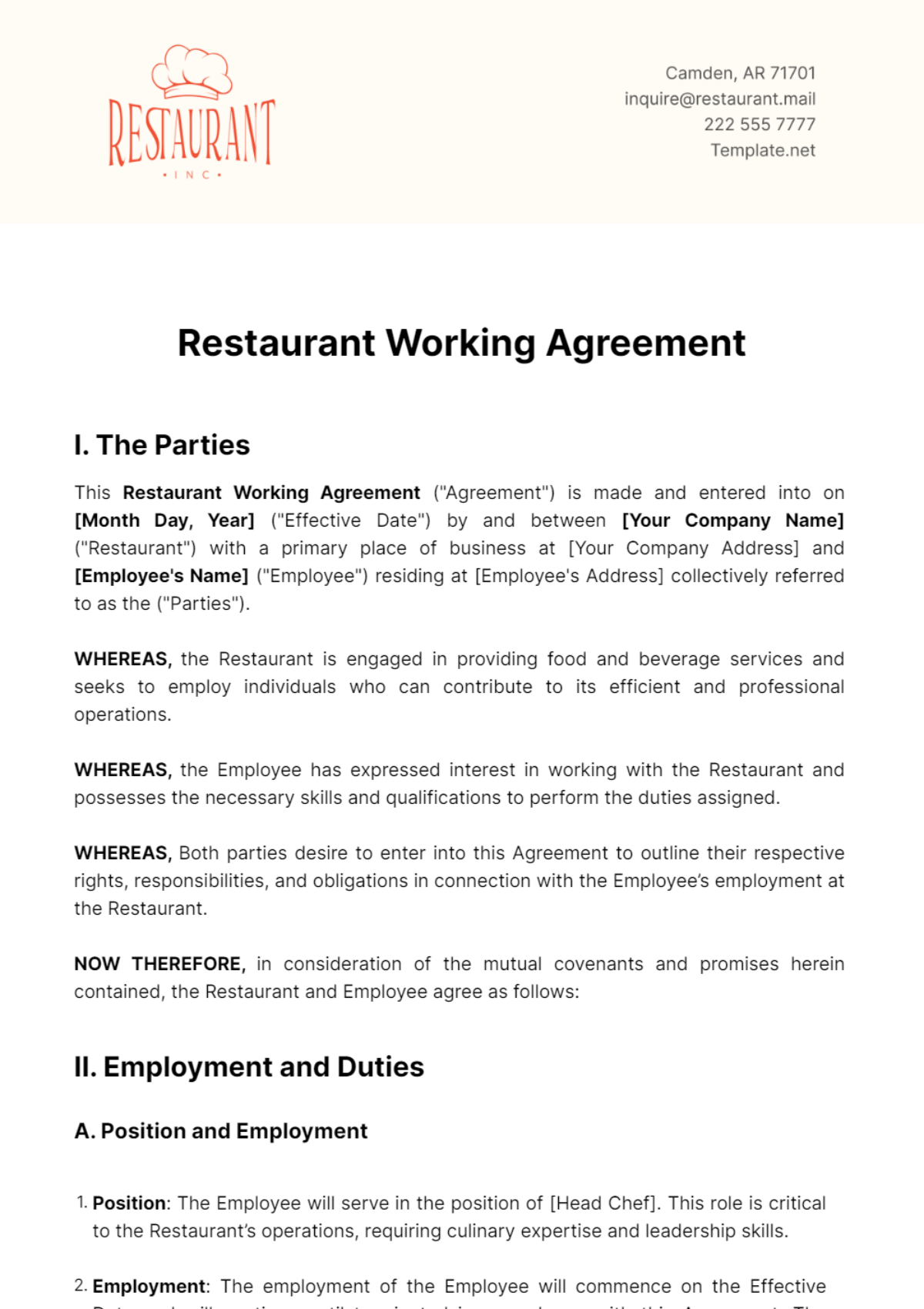
I. The Parties
This Restaurant Working Agreement ("Agreement") is made and entered into on [Month Day, Year] ("Effective Date") by and between [Your Company Name] ("Restaurant") with a primary place of business at [Your Company Address] and [Employee's Name] ("Employee") residing at [Employee's Address] collectively referred to as the ("Parties").
WHEREAS, the Restaurant is engaged in providing food and beverage services and seeks to employ individuals who can contribute to its efficient and professional operations.
WHEREAS, the Employee has expressed interest in working with the Restaurant and possesses the necessary skills and qualifications to perform the duties assigned.
WHEREAS, Both parties desire to enter into this Agreement to outline their respective rights, responsibilities, and obligations in connection with the Employee’s employment at the Restaurant.
NOW THEREFORE, in consideration of the mutual covenants and promises herein contained, the Restaurant and Employee agree as follows:
II. Employment and Duties
A. Position and Employment
Position: The Employee will serve in the position of [Head Chef]. This role is critical to the Restaurant’s operations, requiring culinary expertise and leadership skills.
Employment: The employment of the Employee will commence on the Effective Date and will continue until terminated in accordance with this Agreement. The Employee’s commitment and dedication are crucial to the success of the Restaurant.
Agreement: The Employee acknowledges that this Agreement constitutes the entire agreement between the Employee and the Restaurant regarding the terms of the Employee’s employment. This Agreement ensures clarity and mutual understanding between both parties.
B. Primary Duties
The Employee’s primary duties will include, but are not limited to:
Menu Planning: The Employee will be responsible for planning and developing menus. This involves researching, designing, and implementing innovative and appealing menus that cater to our customers’ tastes and preferences.
Food Preparation: The Employee will oversee the preparation of meals. This includes ensuring that the food meets high quality standards, adheres to health and safety regulations, and satisfies our customers’ expectations
.
Kitchen Management: The Employee will manage kitchen staff and ensure the kitchen is clean and operational. This involves coordinating tasks, maintaining a positive work environment, and ensuring efficient use of resources.
Staff Supervision: The Employee will supervise the kitchen staff, providing guidance and feedback as necessary. This includes fostering a team-oriented environment, addressing any issues promptly, and promoting professional growth among staff members.
C. Performance of Duties
Faithfulness: The Employee will perform their duties in a faithful manner, always acting in the best interests of the Restaurant. This includes adhering to the Restaurant’s policies, upholding its values, and striving for excellence in all tasks.
Diligence: The Employee will perform their duties diligently, putting forth their best effort at all times. This involves showing initiative, being proactive, and consistently delivering high-quality work.
Ability: The Employee will perform their duties to the best of their ability, using their skills and experience to benefit the Restaurant. This includes continuously improving their skills, staying updated with industry trends, and seeking feedback for improvement.
III. Compensation
A. Salary
As compensation for services rendered, the Employee shall receive a monthly salary of [$4,000].
Payment: The salary will be paid on a monthly basis, on the last working day of each month. This ensures that the Employee receives regular and timely compensation for their services.
Services Rendered: The salary is compensation for all services rendered by the Employee during their employment. This includes all tasks and responsibilities associated with the Employee’s role.
B. Additional Compensation
In addition to the monthly salary, the Employee may be entitled to:
Overtime Pay: If the Employee works more than the standard number of hours in a week, they may be entitled to overtime pay, as per the Restaurant’s policies. This compensates the Employee for any additional time and effort put into their work.
Tips: The Employee may receive tips from customers. These tips are considered part of the Employee’s compensation and reward the Employee for providing excellent service.
Bonuses: The Employee may be eligible for bonuses, based on their performance and the Restaurant’s profitability. These bonuses serve as an incentive for the Employee to contribute to the Restaurant’s success.
C. Withholdings
All payments made to the Employee under this Agreement will be subject to:
Taxes: The Restaurant will withhold all applicable federal, state, and local taxes from the Employee’s compensation. This ensures that the Employee’s income is reported accurately and taxes are paid appropriately.
Social Security and Medicare: The Restaurant will withhold Social Security and Medicare taxes from the Employee’s compensation. These contributions are mandatory and provide the Employee with certain benefits.
Other Withholdings: The Restaurant may withhold other amounts from the Employee’s compensation as required by law. This could include garnishments, levies, or other legally required deductions.
IV. Working Hours
A. Standard Working Hours
Weekly Hours: The Employee is expected to work a total of [40] hours each week. This standard workweek is designed to ensure that the Restaurant operates efficiently and effectively.
Daily Hours: The standard working hours for each day are from [9:00 AM] to [5:00 PM]. These hours have been established to align with peak business hours and to ensure a balanced workload for the Employee.
Flexibility: The Employee may be required to work outside of these hours on occasion, depending on the needs of the Restaurant. This flexibility is necessary to accommodate special events or unexpected circumstances.
B. Modification of Working Hours
Operational Needs: The Restaurant may need to adjust the Employee’s working hours based on its operational needs. This could be due to changes in business hours, staffing needs, or special events.
Notice: The Restaurant will provide the Employee with adequate notice of any changes to their working hours. This notice allows the Employee to adjust their personal schedule accordingly.
Employee Agreement: The Employee agrees to work the modified hours as needed. This agreement is essential to maintain the smooth operation of the Restaurant.
C. Overtime
Overtime Work: The Employee may be required to work more than their standard weekly hours on occasion. This overtime work could be due to increased customer demand, staff shortages, or special events.
Overtime Pay: The Employee will be compensated for any overtime work in accordance with the Restaurant’s policies and applicable laws. This ensures that the Employee is fairly compensated for their additional time and effort.
Overtime Approval: Any overtime work must be approved in advance by the Restaurant. This approval process ensures that overtime is managed effectively and used only when necessary.
V. Term and Termination
A. Term of Agreement
Initial Term: The initial term of this Agreement is [1] year, commencing on the Effective Date. This term provides a defined period of employment, offering stability for both the Employee and the Restaurant.
Extension: The term of this Agreement may be extended upon mutual agreement of the Restaurant and the Employee. This extension allows for continuity of service and maintains the working relationship between the Employee and the Restaurant.
Continuation: If the Agreement is not terminated or extended, it will continue on a month-to-month basis after the initial term. This continuation provides flexibility for both parties while maintaining the terms of the Agreement.
B. Termination by Notice
Notice Period: Either party may terminate this Agreement by providing [30] days written notice. This notice period allows both parties to make necessary arrangements following the termination of the Agreement.
Form of Notice: The notice must be in writing and delivered to the other party. This formal notice ensures clear communication and provides a record of the intention to terminate the Agreement.
Effective Date of Termination: The termination will become effective at the end of the notice period. This effective date provides a clear end point to the employment relationship.
C. Termination for Cause
Cause for Termination: The Restaurant may terminate the Employee’s employment for cause, such as misconduct or poor performance. This provision ensures that the Restaurant can maintain its standards of conduct and performance.
No Notice Required: In the case of termination for cause, the Restaurant is not required to provide notice. This allows the Restaurant to take immediate action in response to serious issues.
Applicable Laws: The termination will be carried out in accordance with applicable laws. This ensures that the termination process is fair and legal.
VI. Confidentiality
A. Confidentiality Obligations
Confidential Information: The Employee acknowledges that they will have access to confidential information of the Restaurant. This includes, but is not limited to, recipes, customer data, business strategies, and operational procedures.
Non-Disclosure: The Employee agrees not to disclose any confidential information to any third party. This includes both during and after their employment, unless they have the Restaurant’s written consent.
Protection of Confidential Information: The Employee agrees to take all reasonable steps to protect the Restaurant’s confidential information. This includes storing the information securely and limiting access to those who need to know.
B. Proprietary Information
Proprietary Information: The Employee acknowledges that the Restaurant’s proprietary information is a valuable asset. This includes recipes, business strategies, marketing plans, and customer lists.
Non-Use: The Employee agrees not to use the Restaurant’s proprietary information for their own benefit or for the benefit of any third party. This includes both during and after their employment.
Return of Proprietary Information: Upon termination of their employment, the Employee agrees to return all proprietary information to the Restaurant.
C. Consent for Disclosure
Request for Consent: If the Employee needs to disclose any confidential or proprietary information, they must first obtain the Restaurant’s written consent.
Granting of Consent: The Restaurant may grant consent at its discretion. The consent will specify what information can be disclosed and to whom.
Unauthorized Disclosure: If the Employee discloses information without consent, they may be subject to disciplinary action, including termination of employment and legal action.
VII. Governing Law
A. Applicable Law
Choice of Law: The parties agree that the laws of [State Name] will govern this Agreement. This includes any disputes that may arise out of or in connection with the Agreement.
Interpretation: The Agreement will be interpreted in accordance with the laws of [State Name]. This means that any ambiguities in the Agreement will be resolved as per the legal principles of [State Name].
Compliance: Both parties agree to comply with all applicable laws of [State Name] in performing their obligations under the Agreement.
B. Jurisdiction
Dispute Resolution: If a dispute arises out of or in connection with this Agreement, the parties agree to resolve the dispute in the courts located in [State Name].
Jurisdiction: The parties agree that the courts located in [State Name] will have exclusive jurisdiction over any disputes arising out of or in connection with this Agreement.
Legal Proceedings: Any legal proceedings related to this Agreement will be conducted in the courts located in [State Name]. Both parties agree to submit to the jurisdiction of these courts.
VIII. Entire Agreement
A. Agreement Supersedes Previous Agreements
Supersession: This Agreement replaces all previous agreements between the Employee and the Restaurant. This means that any prior agreements, whether oral or written, are no longer in effect.
Consistency: Having one comprehensive agreement helps to avoid confusion or misunderstandings that could arise from multiple agreements.
B. Modifications to the Agreement
Written Modifications: Any changes to this Agreement must be made in writing. This ensures that both parties have a clear understanding of the changes.
Mutual Agreement: Both the Employee and the Restaurant must agree to any modifications. This ensures that both parties have a say in any changes to the Agreement.
Signature: Both parties must sign any modifications to the Agreement. This provides a record of their agreement to the changes.
C. Complete Understanding
Understanding: This Agreement sets out the full understanding between the Employee and the Restaurant. It covers all aspects of the Employee’s employment, including duties, compensation, working hours, and more.
Clarity: The Agreement provides clarity and certainty for both parties. It outlines the expectations and obligations of both the Employee and the Restaurant.
Reference: The Agreement serves as a reference that both parties can turn to if any questions or disputes arise during the term of employment.
IX. Signatures
IN WITNESS WHEREOF, the parties hereto have executed this Agreement as of the day and year first above written.
Restaurant

[Authorized Representative Name]
[Your Company Name]
Date: [Month Day, Year]
Employee

[Employee's Name]
Date: [Month Day, Year]
- 100% Customizable, free editor
- Access 1 Million+ Templates, photo’s & graphics
- Download or share as a template
- Click and replace photos, graphics, text, backgrounds
- Resize, crop, AI write & more
- Access advanced editor
Define work terms clearly with ease with the Restaurant Working Agreement Template available here on Template.net! This editable agreement can be tailored to specific job roles. The customizable format ensures it aligns with your operational needs, while the AI Editor Tool aids in creating precise and professional agreements. Get started!
You may also like
- Lease Agreement
- Non Compete Agreement
- Rental Agreement
- Prenuptial Agreement
- Non Disclosure Agreement
- Operating Agreement
- Hold Harmless Agreement
- LLC Operating Agreement
- Arbitration Agreement
- Purchase Agreement
- Residential Lease Agreement
- Executive Agreement
- Confidentiality Agreement
- Contractor Agreement
- Partnership Agreement
- Postnuptial Agreement
- Collective Bargaining Agreement
- Loan Agreement
- Roommate Agreement
- Commercial Lease Agreement
- Separation Agreement
- Cohabitation Agreement
- Room Rental Agreement
- Child Custody Agreement
- Employee Agreement
- License Agreements
- Settlement Agreement
- Joint Venture Agreement
- Indemnity Agreement
- Subordination Agreement
- Sales Agreement
- Agreements Between Two Parties
- Business Agreement
- Real Estate Agreement
- HR Agreement
- Service Agreement
- Property Agreement
- Agreement Letter
- Restaurant Agreement
- Construction Agreement
- Finance Agreement
- Marketing Agreement
- Payment Agreement
- Investment Agreement
- Management Agreement
- Nonprofit Agreement
- Software Agreement
- Startup Agreement
- Agency Agreement
- Copyright Agreement
- Collaboration Agreement
- Reseller Agreement
- Car Rental Agreement
- Cleaning Services Agreement
- Consultant Agreement
- Deed Agreement
- Car Agreement
- Equipment Agreement
- Shares Agreement
- Data Sharing Agreement
- Advertising Agreement
- School Agreement
- Franchise Agreement
- Event Agreement
- Travel Agency Agreement
- Vehicle Agreement
- Board Resolution Agreement
- Land Agreement
- Binding Agreement
- Tenancy Agreement
- Exclusive Agreement
- Development Agreement
- Assignment Agreement
- Design Agreement
- Equity Agreement
- Mortgage Agreement
- Purchase and Sale Agreement
- Shareholder Agreement
- Vendor Agreement
- Royalty Agreement
- Vehicle Lease Agreement
- Hotel Agreement
- Tenant Agreement
- Artist Agreement
- Commission Agreement
- Consignment Agreement
- Debt Agreement
- Recruitment Agreement
- Training Agreement
- Transfer Agreement
- Apprenticeship Agreement
- IT and Software Agreement
- Referral Agreement
- Resolution Agreement
- Waiver Agreement
- Consent Agreement
- Partner Agreement
- Social Media Agreement
- Customer Agreement
- Credit Agreement
- Supply Agreement
- Agent Agreement
- Brand Agreement
- Law Firm Agreement
- Maintenance Agreement
- Mutual Agreement
- Retail Agreement
- Deposit Agreement
- Land Purchase Agreement
- Nursing Home Agreement
- Supplier Agreement
- Buy Sell Agreement
- Child Support Agreement
- Landlord Agreement
- Payment Plan Agreement
- Release Agreement
- Research Agreement
- Sponsorship Agreement
- Buyout Agreement
- Equipment Rental Agreement
- Farm Agreement
- Manufacturing Agreement
- Strategic Agreement
- Termination of Lease Agreement
- Compliance Agreement
- Family Agreement
- Interior Design Agreement
- Ownership Agreement
- Residential Lease Agreement
- Retainer Agreement
- Trade Agreement
- University Agreement
- Broker Agreement
- Dissolution Agreement
- Funding Agreement
- Hosting Agreement
- Investor Agreement
- Memorandum of Agreement
- Advisory Agreement
- Affiliate Agreement
- Freelancer Agreement
- Grant Agreement
- Master Service Agreement
- Parking Agreement
- Subscription Agreement
- Trust Agreement
- Cancellation Agreement
- Horse Agreement
- Influencer Agreement
- Membership Agreement
- Vacation Rental Agreement
- Wholesale Agreement
- Author Agreement
- Distributor Agreement
- Exchange Agreement
- Food Agreement
- Guarantee Agreement
- Installment Agreement
- Internship Agreement
- Music Agreement
- Severance Agreement
- Software Development Agreement
- Storage Agreement
- Facility Agreement
- Intercompany Agreement
- Lending Agreement
- Lodger Agreement
- Outsourcing Services Agreement
- Usage Agreement
- Assurance Agreement
- Photography Agreement
- Profit Sharing Agreement
- Relationship Agreement
- Rent To Own Agreement
- Repayment Agreement
- Volunteer Agreement
- Co Parenting Agreement
- HVAC Agreement
- Lawn Care Agreement
- SAAS Agreement
- Work from Home Agreement
- Coaching Agreement
- Protection Agreement
- Security Agreement
- Repair Agreement
- Agreements License
